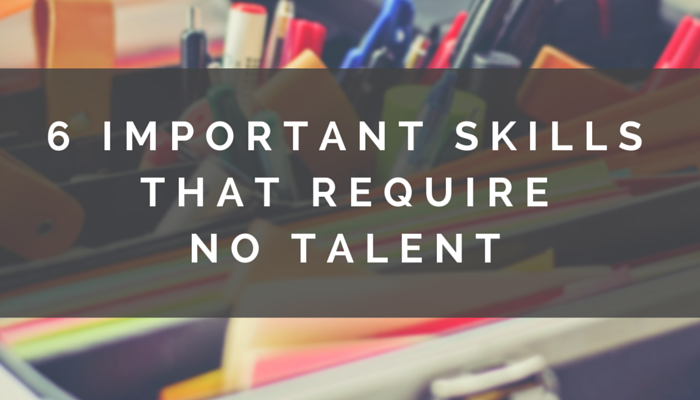Degrees, certifications, training sessions, mentoring, and shadowing; these are all great opportunities to expand knowledge in your industry and further your career.
Did you know there are other things you can do to enhance your performance at work? And get this… they require little talent or additional skills!
From entry-level roles in manufacturing and logistics to executive-level leadership, read on to learn six important skills to help you be more successful — at work, and in life.

1. Timeliness
Be on time! Punctuality is a great habit to employ in both your professional and personal life.
Being chronically late does not necessarily imply laziness and it doesn’t always mean you’re a bad worker.
There’s an article that suggests optimistic people are oftentimes the ones who run late because they’re hopeful that they can fit more tasks into a limited amount of time — i.e. in the morning before leaving for work.
Perhaps you wake up plenty early enough, but still find yourself running around your apartment like a maniac trying to accomplish various duties right before you head out the door.
Yes, you may make up your hours for the week by taking a shorter lunch or staying late. And you may be the optimistic chronically late person. You can blame your lateness on the way your brain is wired and you can make excuses about the traffic that regularly peppers your commute.
But the truth is, those excuses get old to a lot of people really quick. In the end, being on time just looks better.
Being on time is great, being early is even better. It shows you have respect for others’ time and that you are a true professional.
2. Be a Team Player
Being a team player is a positive quality for any career field — from manufacturing and logistics, distribution and warehouse to entrepreneur and C-Suite leadership.
Do your best to work well with others. Take responsibility for your actions and mistakes. Give credit where credit is due.
A helpful phrase to keep in mind no matter what company you work for is “It’s a WE program.” Approaching both positive and negative occurrences with a team attitude is often the best route to take for everyone involved.
When great accomplishments happen in the workplace, don’t forget about your team and who helped along the way to accomplishing your goal.
When something goes wrong, even if it might not have been your error, it shows good character to refrain from pointing fingers and throwing co-workers under the bus. Knowing that if one member of your team messes up, then the whole team messes up, helps build morale and camaraderie in the workplace.

3. Productivity
To be productive in the workplace, you must aspire to produce quality work in a reasonable amount of time. Avoid falling into the habit of only doing the minimum amount required.
Is your workload light this week? Ask your supervisor if you can take on an extra project. Check with your co-workers to see if they have any goals you can help them accomplish. It’s better and more impressive to go above and beyond instead of sitting idly by, waiting for work to be assigned to you.
Do your best to stay on task. Don’t procrastinate by checking Facebook, TikTok, Twitter, or other social media too often. Make yourself aware of which projects require more time by keeping a document to log the hours you spend on various tasks. You might be surprised to see where most of your time is going.
Are you taking extra long lunches or hanging out at the coffee station more often than necessary? Don’t get us wrong…breaks are important (and legally required!) and we love a funny cat video as much as the next person.
But it is beneficial to keep them limited throughout your work day and to try not to get too sidetracked wasting valuable time. You may want to try this tactic which states the formula for perfect productivity is to work for 52 minutes, break for 17, and then repeat the cycle.
At the end of the day, take a look at your performance and ask yourself “Would I hire me?” Strive to be the type of employee you would want working for you.
4. Positive Attitude

Starting the workday with a “glass half full” attitude can have a big impact on how productive and enjoyable your day will be. If you head in with a smile and optimism, your coworkers will take notice and chances are, your positive outlook will rub off on them too.
Has a co-worker helped you recently? Be appreciative! If people take time out of their workday to answer questions and help you out, make sure you let them know how much it means to you by thanking them. Return the favor later on, if you can.
Volunteer your time by joining committees, getting involved in workplace extracurricular events, and attending team outings to build relationships with other employees. Entrepreneur stated that “78 percent of people who work 30 to 50 hours a week spend more time with coworkers than with their families,” so do what you can to make the most of your work experience.
Take time to celebrate birthdays, anniversaries, and holidays. Be on the lookout for opportunities to experience company culture and you will enjoy coming to work that much more.
5. Preparation
Set goals and intentions for what you want to accomplish each day. Have a plan!
Are you calling a meeting? Even if it is just a one-on-one with your boss to talk about next steps, it is helpful to prepare an outline or agenda, including talking points.
Have a purpose for the meeting. What action items do you want to come out of the meeting? Bring examples. Have something to show for what you have been working on.
Doing these things will help you present your ideas clearly and establish next steps. Without clear messaging, you are less likely to meet your goals.
Being mentally prepared is equally important. Get a good night’s sleep. Get up early enough to get things done before you head out the door. (See #1) Doing this allows you to go into work in the morning with a clear head. You can give your full attention to your job and leave the personal distractions at home.
6. Be Coachable
It is imperative to possess the ability to accept feedback and constructive criticism from your supervisors and peers without being defensive. Unfortunately, sometimes we struggle with this and take the critique as an attack on our work.
In the heat of the moment, it can be a challenge to respond calmly to the person giving the feedback, but remember they are just trying to be helpful. View this as an opportunity to learn and grow professionally.
Be open to change and new perspectives. This is a chance to improve your skills and the end product. Be a good listener and remember to thank them for the feedback. Make sure to ask any questions you may have so you fully understand the suggestions for improvement.
Conclusion
This is by no means an exhaustive list, but it is a good place to start taking steps to becoming more successful in the workplace. It’s not about having a specific set of work skills related to your daily responsibilities. It’s about maximizing the soft skills that benefit you, your team, and your employer — no matter what your job is.
Do you possess many of these skills? Get in touch with an AIS recruiter today for your next opportunity!





